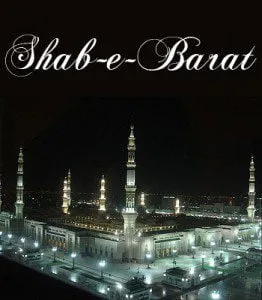Mid-Sha’ban is the 15th day of the eighth month (Sha’ban) of the Islamic lunar calendar. The preceding night is known as Laylatul Bara’ah or Laylatun Nisfe min Sha’ban in the Arab world, and as Shab-e-barat (شب برات) in Afghanistan, Bangladesh, Pakistan, Iran and Muslim parts of India. These names are translated to the night of records, the night of assignment and the night of deliverance, and the observance involves a festive nightlong vigil with prayers. In some regions, this is also a night when one’s deceased ancestors are commemorated.
observance involves a festive nightlong vigil with prayers. In some regions, this is also a night when one’s deceased ancestors are commemorated.
Sunni view
Sunnis observe mid-Sha’ban as a night of worship and salvation. Various ahadith have been transmitted in this regard, some weak and others graded hasan or sahih. Scholars including Al-Shafi‘i, Al-Nawawi, Al-Ghazali and Al-Suyuti have declared praying on the night of mid-Sha’ban as acceptable.
In his Majmu`, Al-Nawawi quoted Al-Shafi`i saying that there are 5 nights when dua (prayer) is answered, one of them being the night of the 15th of Sha`ban.
There are many other narrations from Sahaba and early Muslims confirming this matter, as mentioned by Ibn Rajab al-Hanbali in his Lataif al-Ma`arif, amongst others.
About hadith
On this night, Muslims perform Nawaafil, recite the Qur’an, Salawat, Kalima Tayyibah, and seek forgiveness.
As for the other narrations concerning the 15th of Sha’baan (which are not believed authentic), the Hanafi scholar, Shaikh Mulla ‘Alee al-Qaaree (d.1014H) records some of these hadith:
In another narration, the following people have also been mentioned:
One who deals in usury (Riba),
One who wears his trousers below his ankle with pride and arrogance (In Arabia, people displayed their wealth and boasted in this manner),
One who creates disunity among two Muslims,
The person who unjustly takes away the right and property of another Muslim and has not yet rectified himself.
All these persons do not receive mercy of Allah at all time, as well as on this auspicious Night. A humble appeal to seek pardon and ask Allah’s forgiveness
Also on this night the Doors of Mercy and Forgiveness are opened wide,and those who sincerely grieve over and repent for their past sins and seek forgiveness from Allah are pardoned and forgiven by Allah.[citation needed]
Each Tasbih or Du’a should begin and terminate with the recital of Salawat and one who wishes for the acceptance of his Du’as should use the Wasila of Muhammadﷺ.[citation needed]
Shaykh Abd al-Qadir al-Gilani has mentioned in his book ”Ghunyat li Talibee Tariqil Haqq” (i.e., The Gift for the student who seeks the path of truth) that the month of Shaban according to some narrations is related to Muhammad ﷺ. So, it is the duty of Muslims, as the followers of Muhammad ﷺ to love and respect this month more than any other month (besides Ramadhan). Muslims should also offer abundantly salutations upon Muhammad ﷺ.
Ruling
It is the special night of seeking forgiveness and repenting to God, remembering past sins and sincerely settling the mind that one will never commit sins in the future. All the deeds that are against Shari’ah must be totally avoided so that our Du’a and Istighfaar, hopefully, will be accepted.
never commit sins in the future. All the deeds that are against Shari’ah must be totally avoided so that our Du’a and Istighfaar, hopefully, will be accepted.
Dr. Muhammad al-Jibaly said: The hadith indicates that this night surely has a special merit
Even when hadiths are used to justify the night, Salafi scholars have labeled such hadiths as weak (da’if). Day of Arafa, Laylat al-Qadr and Day of Ashura on the other hand have much stronger references in Quran and/or Hadith..
Shia view
The Shia spend the entire eve of the 15th of Sha’ban in prayers and worship. This day also marks the birthday of their final Imām, Muhammad al-Mahdi. Shia’s believe him to be the Mahdi, an important figure who all the Muslims believe will rid the world of tyranny and injustice.
Salafi View
Some Salafi minhaj[disambiguation needed] claimants oppose the recognition of Mid-Sha’ban as exceptional. However, those “neo-“Salafis dont consider quotations from Imam Ibn Khuzaymah’s book, Kitab At-Tawheed wa Ithbat Sifat ar-Rabb (which is used extensively by Salafis for ‘Aqeedah), about Mid-Sha’ban. Imam Ibn Khuzaymah has specifically mentioned the night of Nisf-Sha’ban in his book (in the section on Nuzool, i.e. The descent of Allah) from the hadith of Abu Bakr as-Siddique. He clarified in the same book that, while it has been revealed that Allah does descend to the world every night, the exact method of the descent remains unrevealed.
Many scholars and general people believe that Shab-e-Barat is not what it is believed to be. This belief is based on the fact that there is no mention of such a night in the Quran.
Some quote 44.4 of the Quran to justify the Night from the Quran.
In the South Asia, Muslims make sweets (especially Halwa or Zarda) to be given to the neighbors and the poor on the evening prior to the 15th of Sha’ban.
This hadith is very weak and many scholars advise praying in this night for any special prayers or Dua or any belief that the dead return is false and should not be followed.
SOURCE: WIKIPEDIA
http://en.wikipedia.org/wiki/Mid-Sha’ban